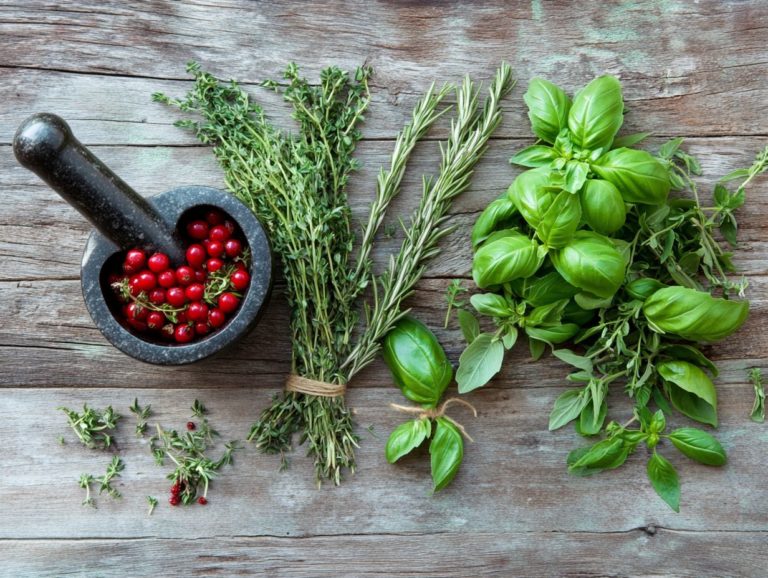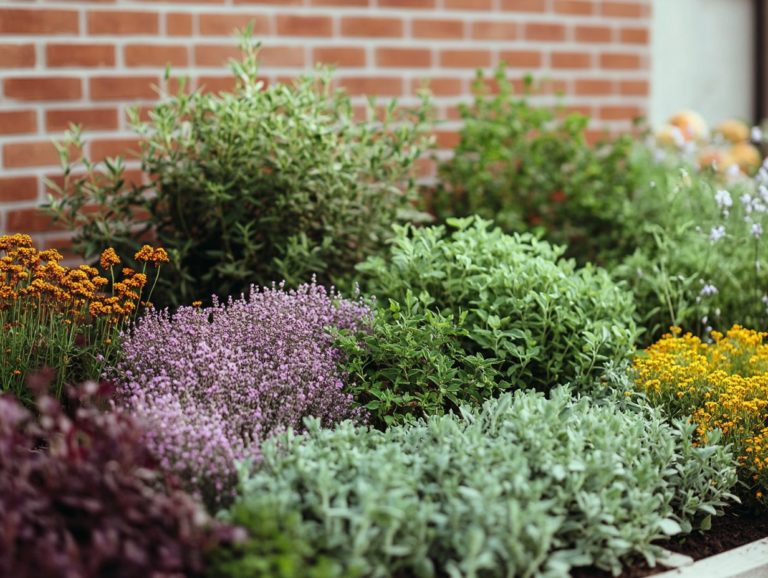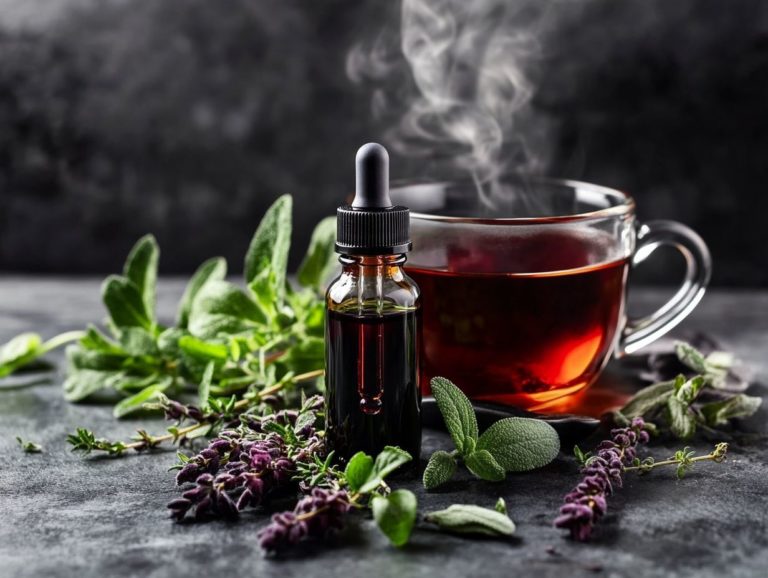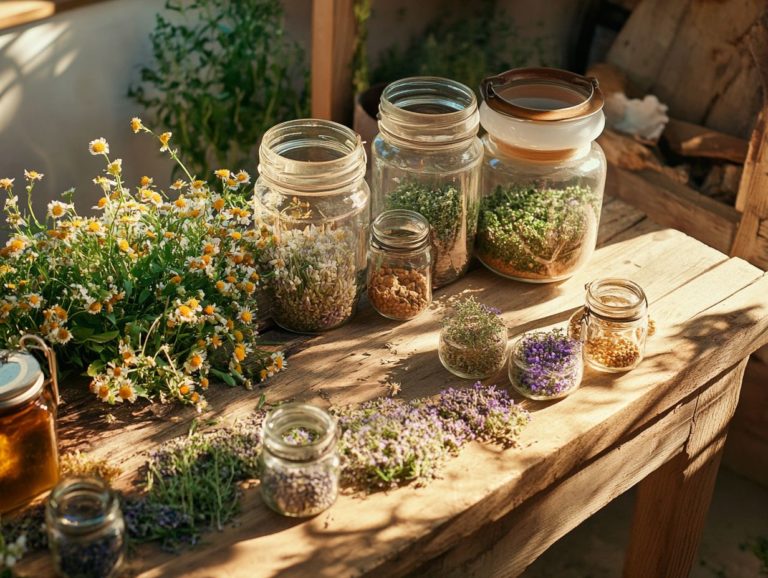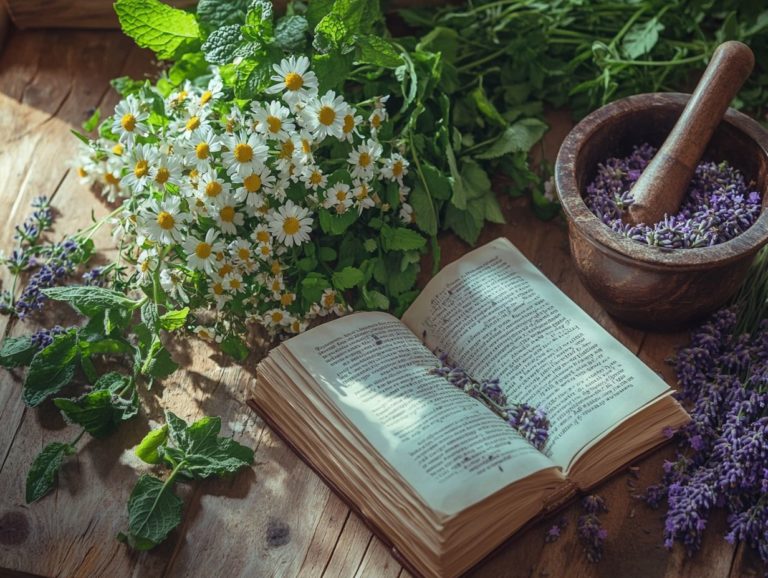What Should I Know About Herbal Remedies for Colds?
When colds strike, you might search for relief beyond conventional medicine. Herbal remedies offer a natural way to alleviate your symptoms.
From soothing throat irritation to easing congestion, various herbs can help you feel better. It’s essential to know how to prepare these remedies, be aware of potential risks, and understand how they could interact with your medications.
Let s explore the amazing world of herbal remedies that can help ease your cold symptoms!
Contents
Key Takeaways:
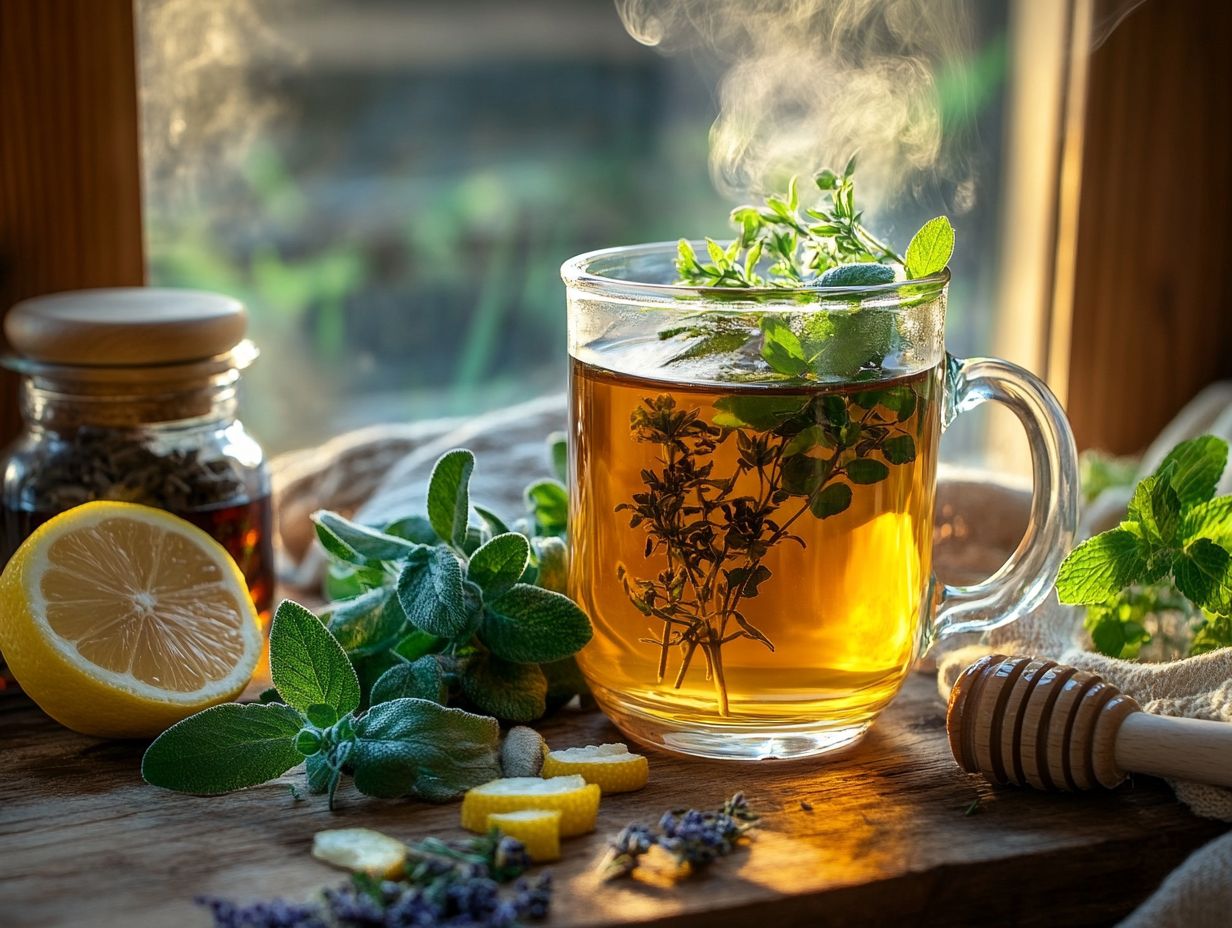
- Herbal remedies for colds provide a natural way to treat symptoms.
- Common herbs like garlic, ginger, and honey have specific benefits for cold symptoms.
- Follow tips for using herbal remedies to enhance your cold care routine.
What are Herbal Remedies?
Herbal remedies are natural treatments from plants that have been used for centuries to improve health. This approach can help with conditions like the common cold and flu by easing symptoms such as nasal congestion, fever, and fatigue.
You ll frequently find ingredients like garlic, ginger, honey, echinacea, and elderberry in these remedies, celebrated for their immune-boosting properties. Incorporating vitamin C and zinc is important for your overall health.
These remedies can effectively treat infections and play a vital role in preventing them by helping you maintain a robust immune system.
Benefits of Using Herbal Remedies for Colds
Exploring herbal remedies for colds presents a wealth of benefits, especially in terms of symptom relief and strengthening your immune system. You may find yourself gravitating toward natural treatments like ginger tea, honey, and echinacea to ease discomforts such as nasal congestion, sore throat, and fever.
Ingredients high in vitamin C and zinc play a pivotal role in boosting immune function, helping you recover faster from colds and flu. Choosing herbal solutions for cold and flu symptoms provides a refreshing alternative to conventional pharmaceuticals, allowing you to embrace a more holistic approach to your well-being.
Natural and Holistic Approach
The natural and holistic approach to treating colds highlights the significance of herbal remedies in restoring balance and fortifying your immune system. By embracing plant-based treatments like garlic, ginger, and honey, you can enhance your overall well-being while alleviating symptoms linked to colds and flu. This philosophy aims to promote long-term health by nurturing your body s innate healing capabilities with herbs like echinacea and elderberry.
Adopting this perspective encourages you to see health as a multifaceted concept that includes physical, emotional, and environmental factors. For instance, garlic, known for its properties that fight germs, serves as a powerful ally against infections, while ginger not only aids digestion but also minimizes inflammation. Honey, with its soothing attributes, acts as a natural cough suppressant, and incorporating herbs like peppermint can provide relief from congestion. Meanwhile, turmeric supports overall bodily function thanks to its anti-inflammatory compounds.
By embracing a comprehensive approach that includes these natural remedies, you can nurture resilience and vitality, ultimately leading to a more balanced and sustainable lifestyle.
Specific Benefits for Cold Symptoms
Herbal remedies offer targeted benefits for alleviating cold symptoms, providing effective relief from nasal congestion, fever, and sore throat. Ingredients like ginger and honey work wonders to soothe inflammation and irritation. Vitamin C-rich options such as elderberry and echinacea strengthen your immune response.
These natural remedies tackle your discomfort head-on and speed up your recovery! If you’re considering incorporating them into your routine, it’s essential to understand what you should know before using herbal remedies. They not only address immediate discomfort but also promote a faster recovery, making them an invaluable part of your cold care routine.
By leveraging the capabilities of nature, these remedies utilize active compounds like the natural compounds that help reduce inflammation and support your immune system found in elderberry, celebrated for their antioxidant properties that can significantly shorten the duration of colds. If you’re curious about other options, you might want to explore the most common herbal remedies. Menthol derived from peppermint delivers a refreshing cooling effect and helps clear nasal passages, enhancing your breathing comfort.
Meanwhile, chamomile shines as a potent herb that alleviates sore throats and boasts mild sedative effects, ensuring you enjoy a restful night’s sleep.
Together, these elements create a comprehensive approach to cold symptom relief, addressing both immediate discomfort and supporting your overall wellness.
Types of Herbal Remedies for Colds
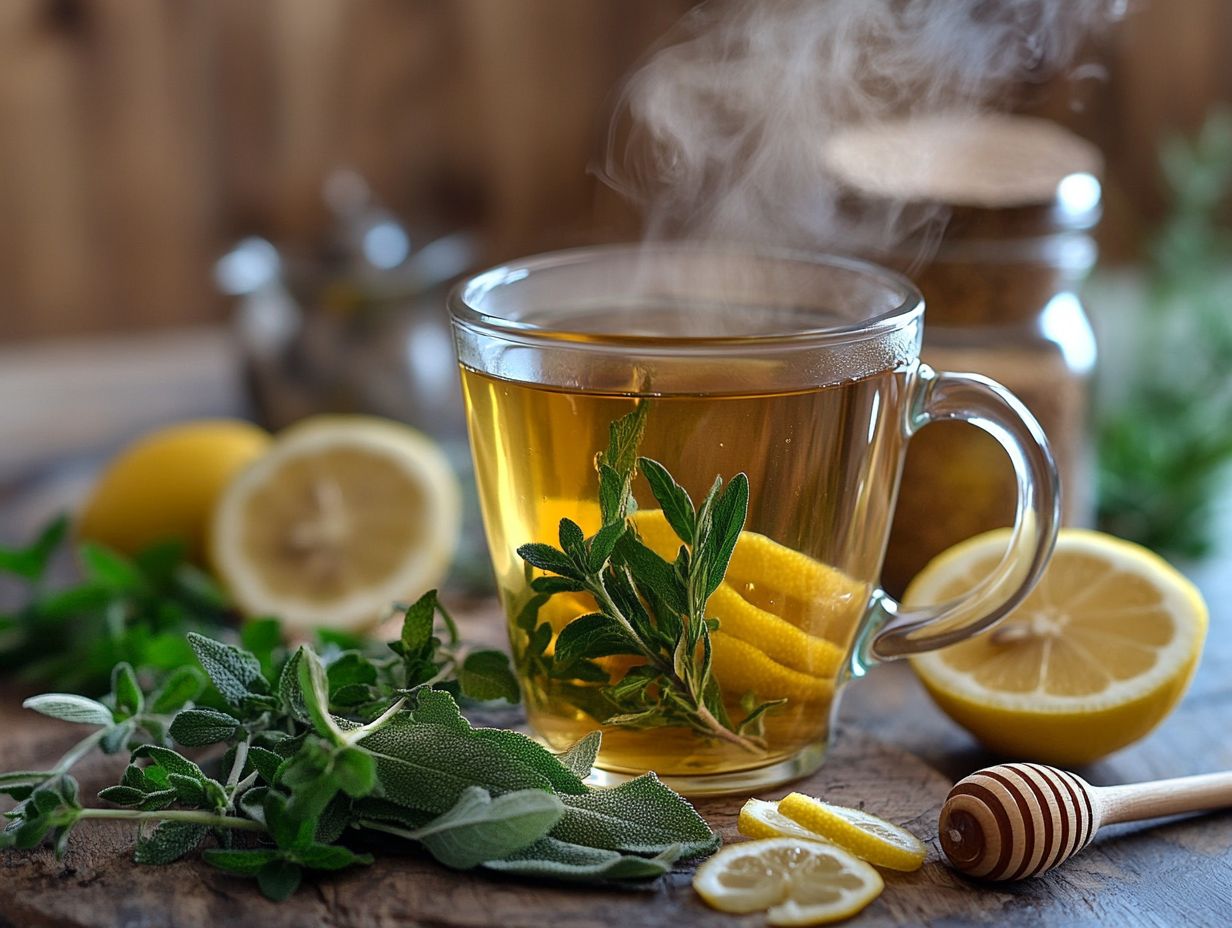
You can explore a wide array of herbal remedies to effectively tackle colds and flu, each leveraging the remarkable properties of ingredients like garlic, ginger, and honey.
These remedies come in various forms teas, tinctures, syrups, and capsules offering you a flexible approach to managing respiratory ailments. Essential herbs such as echinacea and elderberry not only help alleviate symptoms but also bolster your immune system, highlighting the multitude of benefits that come from incorporating herbal teas to soothe your cold symptoms into your cold care routine.
Common Herbs and Plants Used
Common herbs and plants you can utilize for herbal remedies during colds include garlic, ginger, honey, and more potent options like echinacea and elderberry. These natural ingredients are brimming with beneficial compounds that bolster your immune system and alleviate symptoms associated with respiratory infections.
Incorporating herbs such as peppermint and thyme can enhance your relief, acting as natural decongestants. Peppermint, with its soothing menthol, not only opens up your nasal passages but also possesses antimicrobial properties that combat bacteria and viruses. For more insights, you can explore how effective herbal remedies for coughs are.
Meanwhile, thyme is celebrated for its antiseptic qualities and can be brewed into a calming tea that soothes your throat. To maximize their effectiveness, you can take these herbs in various forms teas, tinctures, or even infused into your meals encouraging a holistic approach to your health.
Understanding how these plants interact within your body gives you the power to make informed choices that strengthen your resilience during the cold and flu season. For more insight, explore the best practices for herbal remedy use.
Preparation and Usage Methods
Your preparation and usage methods for herbal remedies can profoundly influence their effectiveness in alleviating cold symptoms. Common approaches include brewing herbal teas, making tinctures, and making syrups using ingredients like honey, garlic, and ginger.
Understanding how to prepare these remedies correctly can elevate their efficacy, ensuring that the beneficial properties of herbs such as echinacea are fully harnessed. To begin, brewing herbal teas involves steeping dried leaves in hot water for several minutes, allowing the medicinal compounds to dissolve and infuse the water with their healing qualities.
For tinctures, a more robust method, you need to combine chopped herbs with alcohol and let the mixture sit for a few weeks, shaking it regularly to extract those potent elements. Syrups can be crafted by simmering herbs with sweeteners, resulting in a soothing blend that coats the throat and provides relief.
Each method has its own distinct advantages: teas offer a gentle solution, tinctures provide concentrated doses, and syrups create a sweetened remedy that s suitable for both children and adults. Mastering these techniques ensures you reap the full spectrum of health benefits from these natural ingredients.
Potential Risks and Side Effects
While herbal remedies provide a wealth of benefits, it’s important to consider the potential risks and side effects that may accompany their use, especially with other medications.
Herbs like garlic and ginger can interact with certain prescription drugs, leading to unintended effects. Understanding the necessary precautions when using herbal remedies such as echinacea and elderberry is crucial. If you’re curious about their effectiveness, you might wonder can herbal remedies help with allergies? This is particularly important for those with specific health conditions.
Interactions with Medications
Interactions between herbal remedies and medications can present significant risks. Certain herbs, like garlic and ginger, might alter the effectiveness of pharmaceutical drugs. If you’re considering remedies like echinacea and elderberry, it’s essential to consult with healthcare professionals about possible interactions to ensure safety and efficacy while managing cold and flu symptoms.
For example, garlic is known to thin the blood, which could enhance the effects of anticoagulant drugs (medications that prevent blood clots), potentially leading to increased bleeding. While ginger aids digestion and reduces nausea, it could also interact with blood sugar medications and affect glucose levels. If you’re looking to boost your immune system with elderberry, remember that it might amplify the effects of certain antiviral drugs, requiring careful monitoring.
Having an open conversation with your healthcare provider can significantly reduce health risks. They can provide personalized advice based on your medical history and current medications, ensuring a safe approach to wellness.
Precautions for Certain Populations
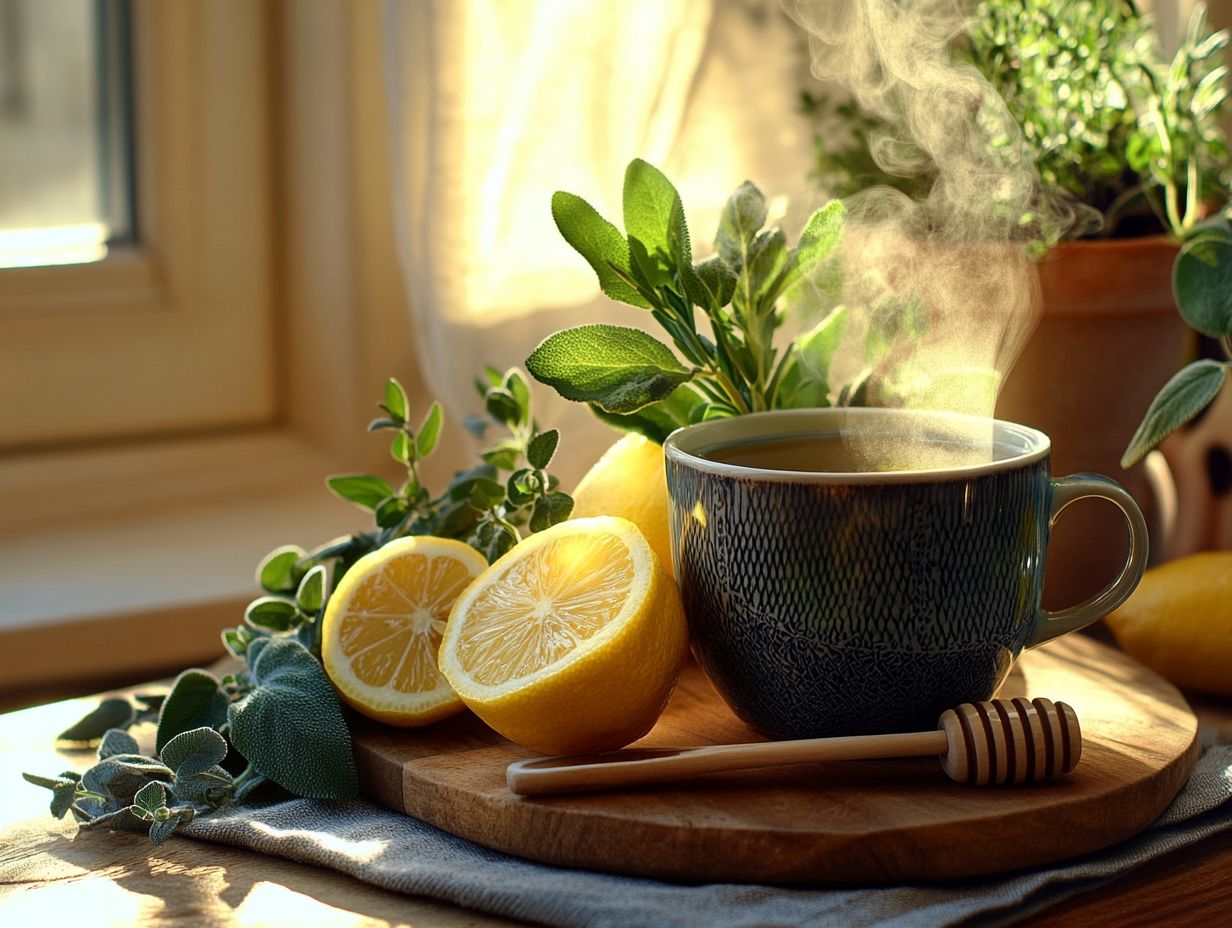
Certain populations, including the elderly, pregnant women, and those who are breastfeeding, should approach herbal remedies with caution due to potential health risks. It’s essential to consider your unique physiological conditions and how herbal ingredients might impact your immune system. Consulting with healthcare providers is crucial for ensuring safe usage and avoiding adverse effects when incorporating remedies like garlic and echinacea.
These groups often have altered metabolic rates and might be taking medications that could negatively interact with herbal products. If you’re pregnant, you must be especially vigilant, as some herbs may affect your health and potentially harm fetal development. Similarly, elderly individuals with a compromised immune system may experience side effects more intensely.
Given these considerations, seek personalized medical advice before starting any new herbal supplement, including herbal remedies for pets. This step helps identify potential risks unique to your situation, allowing you to make informed health decisions.
How to Incorporate Herbal Remedies into Your Cold Care Routine
Incorporating herbal remedies into your cold care routine allows you to embrace a more natural approach to symptom management and immune support. By choosing beneficial ingredients like garlic, honey, ginger, and echinacea, you empower yourself to alleviate discomfort associated with colds and flu.
Creating a consistent routine that integrates these remedies offers immediate relief and promotes long-term health benefits, ensuring you feel your best season after season.
Act now to protect your health by consulting with a healthcare provider about the best herbal options for you!
Tips for Choosing and Using Herbal Remedies
When selecting and utilizing herbal remedies for colds and flu, consider their effectiveness, quality, and your specific symptoms.
Choose high-quality ingredients like garlic, ginger, echinacea, and elderberry. These can improve your results.
Know how to use these remedies correctly such as dosages and preparation methods to elevate the efficacy of these natural treatments.
Make sure to get your products from reputable suppliers who prioritize organic and sustainably harvested herbs. Reading reviews and checking for third-party testing can help you assess the reliability of a product.
Looking into scientific studies behind your chosen herbal solutions will provide valuable insights into their potential effectiveness for your particular ailments.
Engaging with knowledgeable practitioners, such as herbalists or naturopaths, can offer you personalized guidance tailored to your individual health needs. Ultimately, approaching herbal remedies thoughtfully not only improves your outcomes but also deepens your connection with the art of natural healing practices!
Frequently Asked Questions
What Should I Know About Herbal Remedies?
Herbal remedies have been used for centuries to treat common colds and other illnesses. Here are some important things to know about using herbal remedies for colds.
What are herbal remedies?
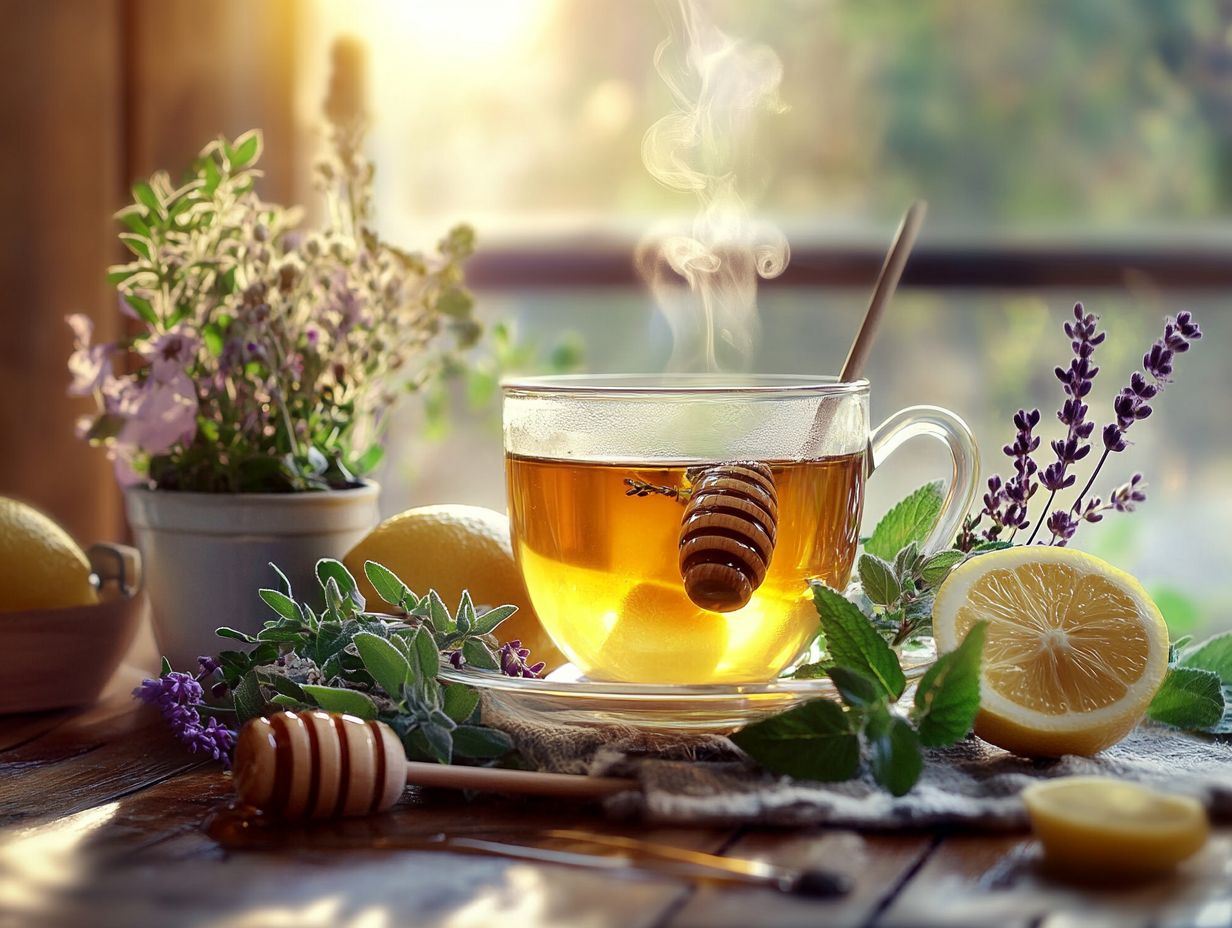
Herbal remedies are natural, plant-based products used to treat various health conditions, including the common cold. They can come in the form of teas, tinctures, capsules, or powders.
Are herbal remedies safe to use for colds and flu?
When used properly and with caution, herbal remedies can be safe and effective for treating colds. However, it is important to consult with a healthcare professional before using any herbal remedies, especially if you have any underlying health conditions or are taking medications.
Which herbal remedies are helpful for colds?
Some herbal remedies that have been traditionally used to treat colds include echinacea, ginger, elderberry, and garlic. These herbs have anti-inflammatory and antiviral properties that may help boost the immune system and alleviate symptoms of the cold.
Are there any risks associated with using herbal remedies for colds?
While herbal remedies are generally considered safe for use, they may have potential side effects such as allergic reactions or interactions with medications. It is important to carefully read product labels and consult with a healthcare professional before using any herbal remedies.
Can herbal remedies cure a cold?
There is no scientific evidence to support the claim that herbal remedies can cure a cold. However, they may help alleviate symptoms and support the immune system to help fight off the virus.
Explore these remedies today and discover the power of nature in your health journey!

